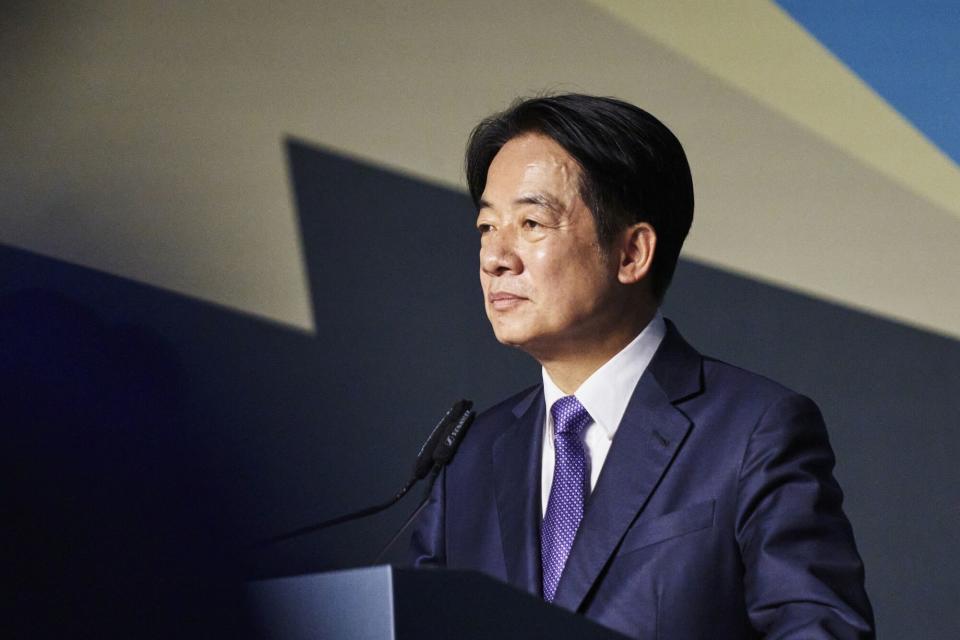Taiwan Inauguration to Help Set Direction for US-China Relations
(Bloomberg) -- Taiwan is poised to usher in a new president, and his initial moments in the role could set the tone for the next four years of US-China relations.
Most Read from Bloomberg
Iran’s President Missing After Helicopter Crash in Dense Fog
Speedier Wall Street Trades Are Putting Global Finance On Edge
Gantz Says He’ll Quit Unless Netanyahu Moves to New War Plan
China-Bound Oil Tanker Hit by Houthi Missile in Red Sea, US Says
The self-governed island of 24 million people — a global hub of chip manufacturing — inaugurates Lai Ching-te on Monday, after an election in which the three main candidates underscored the importance of Taiwan being ruled separately from China.
Lai’s first speech as president will be scrutinized by US policymakers — a group of former officials is flying in for the occasion — seeking signals on the incoming administration’s strategy for relations with China, and Beijing’s reaction.
Read More: Taiwan’s Next President Is Former Kidney Doctor Beijing Despises
Throughout his campaign, Lai, a 64-year-old physician and the current vice president, didn’t stray far from outgoing President Tsai Ing-wen on policy related to ties with China’s Communist Party. He stated that Taiwan is already a de facto sovereign state and vowed to boost military capabilities to maintain the status quo in the strait. That may change depending on how Beijing, which views the island as its territory, reacts.
“Lai will try to strike a balance as Tsai did but will adapt as his term unfolds,” said Steve Tsang, director of the SOAS China Institute in London. “Much will depend on how he reacts to Beijing’s unhelpful approach to him. If Beijing turns much more hostile and aggressive, Lai may well react accordingly.”
The first day of the presidency can define the relationship with China, as past experience has shown. In her first inauguration speech in 2016, Tsai held out the possibility of continuing direct talks with Beijing, without explicitly saying that Taiwan is a part of China. Beijing was quick to deem her offer insufficient, calling her remarks an “an incomplete test paper.”
That stance was in stark contrast with how China handled the relationship with Tsai’s predecessor, Ma Ying-jeou, who President Xi Jinping met for unprecedented talks in 2015 just before Ma left office.
Stability Promise
Lai has echoed Tsai’s “peace, parity, democracy, and dialogue” mantra as a basis for talks with China. He has also said he aims to ensure a “stable and principled” cross-strait relationship.
“We will work to safeguard the status quo on both sides,” Lai said in a speech to the Copenhagen Democracy Summit earlier this week. “I will not rule out dialogue with China on the principles of mutual respect, mutual benefits and dignity with no preconditions.”
There’s a risk that door has already closed. China’s leaders have balked at any notion that Taiwan is independent, with Xi instead making overtures for what he calls the island’s “reunification” with the mainland. Beijing’s military also makes regular appearances near Taiwan.
China signaled this week it plans to apply the same pressure on Lai that it has over Tsai’s eight years. It has sent large sorties of warplanes into sensitive areas around Taiwan, and hit five political commentators with largely symbolic sanctions.
Meanwhile, US economic, political and military support for Taiwan has served only to further irk Chinese leaders.
A senior US administration official who briefed reporters this week argued that Beijing would likely be seen as the provocateur if it chose to respond in a coercive way to the attendance of an American delegation at Lai’s inauguration. The US is not predicting such a reaction, the official added, and it is typical for the Chinese authorities to state their disapproval.
The ceremony marks the third election in a row that voters have chosen a candidate who sees Taiwan’s long-term future as separate from China, signaling a growing sentiment among the populace.
Still, Lai will enter office with a weaker mandate than Tsai after getting just 40% of the vote. He’ll also have to deal with a legislature whose agenda is controlled by the Kuomintang. The opposition party is already seeking ways to expand the power of lawmakers and curb that of the president.
‘Optimism and Hope’
Taiwan sits at the crossroads of economic influence in the region, and is a frequent cause of friction between the two world powers. A major conflict in the region could prove disastrous for global growth and supply chains — not to mention the human toll.
Bloomberg Economics has estimated the price tag of any outright hostilities at around $10 trillion, equal to about 10% of global GDP. That dwarfs the blow from the war in Ukraine, Covid pandemic and global financial crisis.
Conflict is something Beijing and Washington want to avoid. The US and Taiwan reached an arrangement on trade last year, and President Joe Biden has repeatedly pledged to defend the island if China attacks — underscoring the importance of Taipei to the US.
Lai seems keenly aware of the risks, and has tried to portray himself as a steady hand in a difficult situation. He’s also indicated he’ll stand firm in the face of pressure from Beijing.
“China’s coercion has only strengthened our resolve to remain democratic and free,” Lai said this week. “We refuse to submit to fear. We choose optimism and hope.”
Most Read from Bloomberg Businessweek
Netflix Had a Password-Sharing Problem. Greg Peters Fixed It
Walgreens and CVS Are Trying to Fix America’s Flailing Pharmacies
How the ‘Harvard of Trading’ Ruined Thousands of Young People’s Lives
©2024 Bloomberg L.P.




